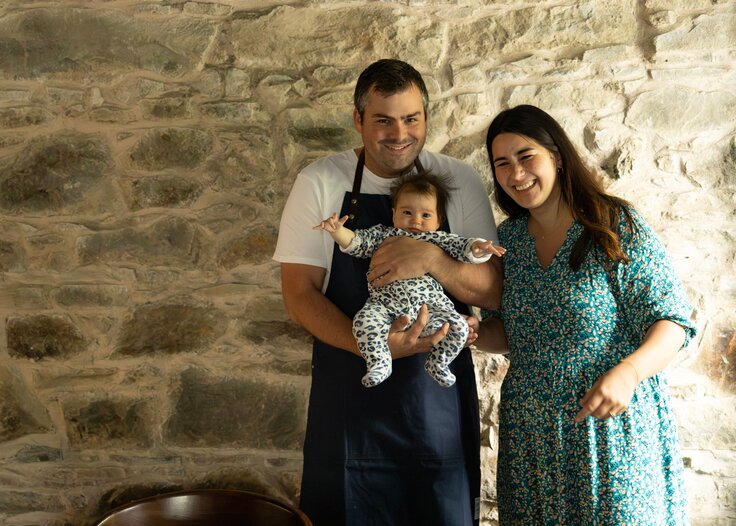
Article
5 min read
Manage festive stress: 5 lessons hospitality can learn from other sectors
Kitty Finstad
Oct 24, 2023
Chapters

Tom Tsappis, Mathilda Ruffle, Killiecrankie. Copyright Alexander Baxter 2023
Who says Q4 is a sackful of stress? Come on, Santa’s on his way and he’s dropping customers down your hospitality business’s chimney in numbers like you haven’t seen all year. Under-staffed? Look on the bright side – your sous chef’s dressed the Christmas tree without falling from the ladder, and only half your wait staff are suddenly off sick. Because, who doesn’t love surprises at this special time of year?
In the second part of the Planday Q4 Survival Guide, we'l learn from successful industry angels who chose hospitality after corporate life, bringing some enlightened thinking with them about how to swerve workplace stress.
Take comfort from the following: most Q4 stresses are, like Christmas and New Year, reassuringly traditional. Entirely predictable. Knowable in advance. And therefore can be pre-empted. Solutions can be put in place before problems raise their party-hatted heads. (By the way, you did know your swags of mistletoe are actively poisonous, right? Phoratoxin apparently.)
So start planning ahead now for the crunch of seasonal issues that are bound to repeat themselves now, and next year, at exactly the same time, in exactly the same way.
Golden rule: If it’s predictable it’s manageable
Meet the team
Tom Tsappis: a former currency broker at a major finance house in London and Tokyo, who's now chef patron of Killiecrankie House
Mathilda Ruffle: former international advertising guru who's now the restaurant's sommelier and heads up Killiecrankie House's hotel arm
Killiecrankie House: Rural Perthshire's The Scotsman’s 2023 Scottish Restaurant of the Year and hotel
 Play the numbers game: hours / staff / budget
Play the numbers game: hours / staff / budget
Here's what two experts say about managing stress in the hospitality industry:
“Don’t wield a cattle prod at your team.”
Tom Tsappis former career path clearly favoured sticks over carrots.
These days he’s chef patron of Killiecrankie House. The hotel side is run by Tom’s wife, Matilda Ruffle.
The scale of the operation – five rooms, three front of house, three in the brigade for 12-18 covers – might imply there’s not much here to get stressed about. Birdsong every morning, a burbling river across the road, carrots growing in the kitchen garden. Yet as every owner of a rural retreat will tell you, the rurality itself greatly complicates recruitment.
But Tom and Matilda make it clear that having their own business does make running it simpler. These two self-described control freaks call the shots.
“We plan the year carefully in advance, and when we go on holiday we shut. Simple as that.”
No delegating, no worrying. Actual downtime.
Their decision to open only four days a week also provides the kind of thinking time that lets them assess how ambitions are progressing and define what needs tweaking, in what order.
“You could say we’d make more money if we opened five or six days,”
says Matilda,
“but how many customers would come on a Monday? And then we’d need a second string of staff.”
 Recruitment realities: lean into your USP
Recruitment realities: lean into your USP
How does a remote location like Killiecrankie manage recruitment? By providing unexpectedly attractive conditions for staff. The rural reality is that running a fine dining experience requires staff with skills most usually honed beyond the immediate locality.
A good number of the core crew here are Scottish, but one thing that makes them stay is the high-quality accommodation they’re given on site. Staff are housed in part of Tom and Matilda’s own home at no cost.
“In a city we’d never have done anything like that. And it was really expensive when utility bills were going through the roof.”
But the commitment was made on both sides. A beer in the garden together when service is done? A sense of belonging helps work move in the right direction.
Killiecrankie is no commune – privacy is prized by all – but the thinking is indubitably right-headed. Recruit the right staff, prove you’re nurturing them, and the follow-through of two-way loyalty is one factor that keeps a lid on stress levels during peak times.
 Listen carefully: match your offer to what staff actually want
Listen carefully: match your offer to what staff actually want
And certainly Tom and Matilda’s approach to managing staff, without being either contrived or gooey, reflects the expectations of young people joining the industry today. For that new generation, well-being and mental health aren’t cheap badges of woke, they’re part of their everyday vocabulary.
That might mean an active listening, arms-round management style, an open-door ‘ask me anything’ policy or scheduled time off for life admin. It could also mean paid pre-shift meditation sessions. Or not. But if you don’t ask, you won’t know.
Tom’s quick to note how the industry has changed, even in the relatively short time since he retrained as a chef:
“No one wants to work the way things were in the 1990s with [names several fiery-tempered celebrity chefs] throwing pans and burning people on stoves. At the same time, you do have to lose staff who turn out lazy – that’s what happens in other sectors. So we’re very upfront here about our expectations and about what people get in return. You’re going to work 56 hours a week, but you’ll live rent-free, you’ll get meals on the days you work and you’ll learn skills that can take you anywhere in the world.”
 Value personal development as part of the culture
Value personal development as part of the culture
Upskilling often happens spontaneously on the job, but it can’t be left to happen accidentally. It needs to be planned in as part of the job, just as it is in office-based businesses. Tom again:
“I’m not gonna send my people on a training course to Slough. Instead we’ve taken them to four or five Michelin-starred restaurants, including in San Sebastián this year. That’s a kind of training, of course, but a softly softly approach.”
The core team at Killiecrankie have been in place for two years now, which speaks volumes in a generally itinerant industry. And constancy like that means a culture can be set. In this case a culture of learning by sharing tips with each other every day, but also by setting time aside each week for pre-arranged technical sessions. Knowing their people are up to new tasks takes the strain off Tom and Matilda.
 Steal ideas from business... then make them your own
Steal ideas from business... then make them your own
Finally, here’s another lesson learned. Not just from the fast lane in Tokyo but from corporate culture in general. Appraisals. They do appraisals at Killiecrankie House. Not exactly an everyday tool in the hospitality industry, apart perhaps for the more enlightened international chains.
“We take each member of staff aside twice a year and talk as people, not as ‘I’m your boss’ but about their career vision and how we can help,”
says Matilda.
“And we ask them how we’re doing too,”
adds Tom.
“How can we all improve? We’re a really collaborative team. Always open to new ways of doing things whether that’s in the kitchen or bar or hotel. Always listening. And, really important this bit, always proving we’re listening to each other.”
Stuff like that must bust stress before it happens.
If much of the above happens spontaneously as part of the culture they’ve built at Killiecrankie House, Tom and Matilda’s decision to consciously build in time for the 360o appraisals they experienced in the corporate world is a direction the industry at large might consider.
So here’s a question for Christmas.
What kind of behind-the-scenes organisational thinking do your customers experience in your establishment? One based on the ramped-up image of creative chaos beloved by the media? Or one based on planned back-of-house efficiencies that help your team deliver relaxed, engaging hospitality?
We guess you know the answer Santa’s looking for.
Merry Q4 to you, and mind that mistletoe!
Click below to see for a demo of Planday’s solution to seasonal stresses.
